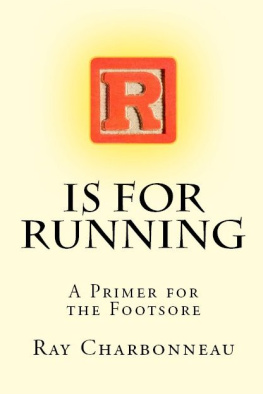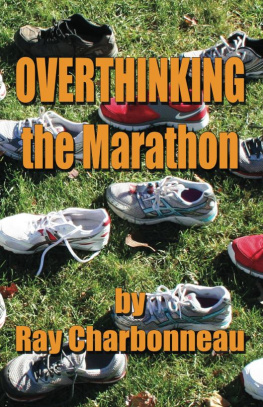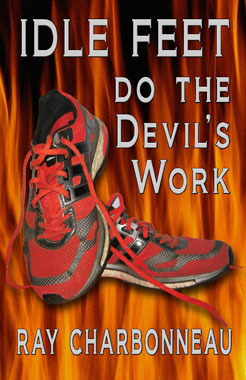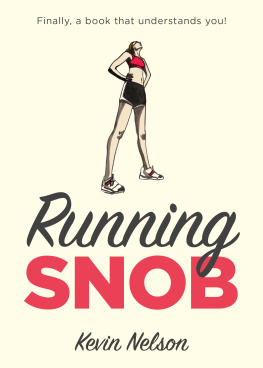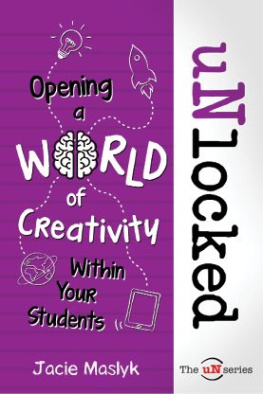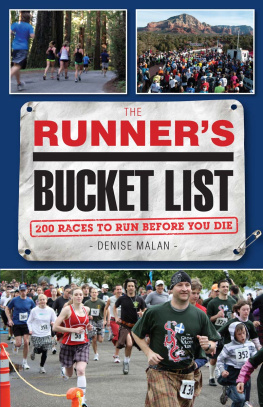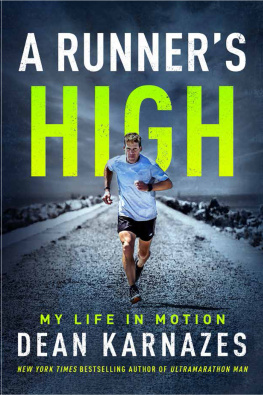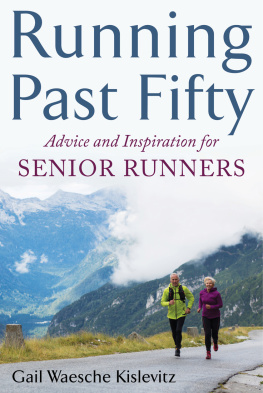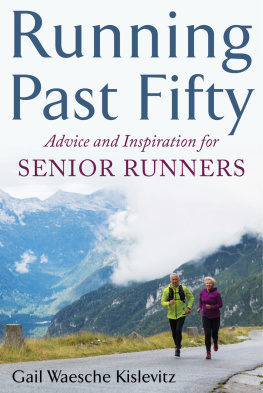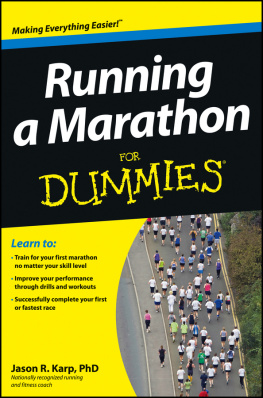Chasing the Runners High
My Sixty Million-Step Program
by
Ray Charbonneau
2010 by Ray Charbonneau
http://www.y42k.com
Also by Ray Charbonneau:
Overthinking the Marathon
R is for Running
Edited by Ray Charbonneau:
The 27th Mile
This work is licensed under the Creative Commons Attribution-NonCommercial-NoDerivs 3.0 Unported License.
Second Smashwords Edition
ISBN: 978-1-45239-399-5
Design: Y42K Book Production Services: y42k.com
Thanks to Ruth Sespaniak, Jim Chido, Mark Bates, Marie Charbonneau, and the Boston Writers Meetup Group for their help with the creation of this book. Any errors that remain are all mine.
Id like to thank everyone whos talked with me before, during, and after a run, helped put on a race, joined in on online discussions, or otherwise contributed to the community of runners thats helped shape my thoughts and encouraged me to keep going in spite of rain, mud, snow, and lazy Sunday mornings. I have received a lot of help from friends Ive met and run with along the way. I hope Ive paid a little of that back over the years by sharing stories and advice with less experienced runners. Hey, Ive even written a book.
Id like to dedicate this particular bit of sharing to:
- Dick Thomas, my manager when I started working at MIT, for showing me that even if youre not a champion, you can still run, have fun, and maybe enjoy a beer or two along the way.
- Steve Burton, the late coach of the Somerville Road Runners, who exemplified dedication to being the best runner he could be, and provided whatever help you needed to be as good as you wanted to be.
- Ruth Sespaniak, world-champion wife, whos love and support means more than I may ever be able to tell her, though Ill certainly keep trying.
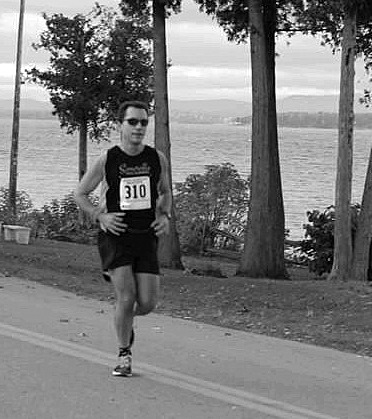
Running along Lake Champlain in the
2004 Green Mountain Marathon
"I have run most of my life on a small offshore Maine island where the main road is only 2 miles long. I estimate I have covered around 75,000 miles on that single piece of broken road. When you have absolutely no option of running a different or varied loop the only decision is whether you will run or not, and how far you will go. Running out on Great Cranberry Island made me feel at times like a caged lion and when I got out into the world to run a race it felt easy simply because I felt free."
-Gary Allen
"Hi. My name is Ray and Im an endorphin addict."
Most people, if they think about running at all, dont think much of the idea. They figure that running is for those scrawny, obsessive types. Its for the guys who dont eat meat, or would rather go out for a long run on Sunday instead of watching the game.
In truth, most runners are average guys or gals whove figured out that the enjoyment and benefits they get from running outweigh the risk of looking odd while running down a winter street in a reflective jacket and spandex tights. But there are some people who go past that and make running a central part of their lives. Some people even fixate on running to the extent that their relationship with the sport can start to look similar to an alcoholics relationship with the bottle.
Im one of those people. If I look at all the running Ive done at one time or another, it looks a lot like addictive behavior. Theres probably a free publication that describes people like me, available from the government print shop in Pueblo, Colorado:
- "Your family complains of your excess running." Been there.
- "Your running tolerance level has increased." Its called "getting in better shape."
- "You use running to cope with problems or to relax." Absolutely!
- "You sneak running alone." "Alone", yes. "Sneak"? Never! Well, hardly ever.
- "You are preoccupied with running." Check.
- "You rationalize your loss of control over running." Check Im doing it now.
- "Most of your friends or acquaintances are people you run with." Hmmm my wife, most of my friends, my running clubCheck.
- "You have lost days of school/work because of running." Ive taken days off to go to a race. Check.
- "You have tried to quit running but cannot. (A good test is voluntarily going for six weeks without running and not experiencing physical or emotional distress.)" Voluntarily? The only time I stop is when an injury forces me to, and I usually start up again before I should. Check.
If youre familiar with 12 step treatment programs, you probably recognize the behavior pattern. And in spite of all this, I continue to justify my habit by telling myself that running is good for me.
Maybe its just that 12 steps arent enough? I track all my running in a log. The current version of my log is on my computer. One thing it does is automatically calculate the total number of miles Ive run since I started logging everything back in 1992. I checked recently, and assuming that my stride length is approximately two feet, I figure that Ive run just about 60 million steps. That represents a lot shoes. It also represents a lot of time; time to think, time to try out ideas, and time to form more than a few opinions about what and why.
In one of my early attempts at running when I was a little boy, I ran down some stairs, crashed into the sharp corner of a metal fireplace, and poked a hole in my head. I learned something valuable that day. I learned that I could get hurt running, but if I did, I could still get back on my feet and keep going. On the other hand, I didnt learn "Be careful when you run." That comes as no surprise to the people who know me.
George Sheehan, the runner and philosopher, once wrote that each runner is an experiment of one. Ive continued to experiment since hitting the fireplace, and this book is my report of the results. Those results has been more successful than some, less successful than others. Ive made plenty of mistakes, but thats how I learned. And thats part of what keeps running interesting. Every day theres something new to try, something that adds to the pile of facts, minutia, and trivia that Ive accumulated.
Ive learned a lot from other people too. Running is essentially a solitary pursuit. No one can run a step for you. But while you have to travel your own trail, part of what keeps it satisfying is the chance to cross paths with others who are following their own trails. When this happens, we get the opportunity to share ideas and encouragement. Ive put some of what people have shared with me in these pages.
I spend a lot of time hanging out with other runners. Because of that, sometimes I forget that some of the things Ive done that youll read about in this book are unusual. Ive accomplished some things as a runner that Im proud of, but this book isnt about how great I am. Ive never been the fastest or strongest runner and Im OK with that.
I wouldnt say Im a typical runner either. Actually, Im not sure what a typical runner is. Is it a weekend jogger, or a sub-16 minute 5K racer, or someone who plans vacations so they can run a marathon in all 50 states, or a granola-eating, mountain-top-meditating, sure-footed trail runner? Whatever it is, I might be a little more determined or reckless than that. Ive been known to push myself further, maybe too far sometimes.
How fast or far I can run isnt whats important. Over the years, Ive tried a lot of things when Im out on a run, or while Im preparing for the next run. Ive learned (and relearned) quite a few things about running and about myself while performing my own ongoing experiment. Thats whats important.
Next page
